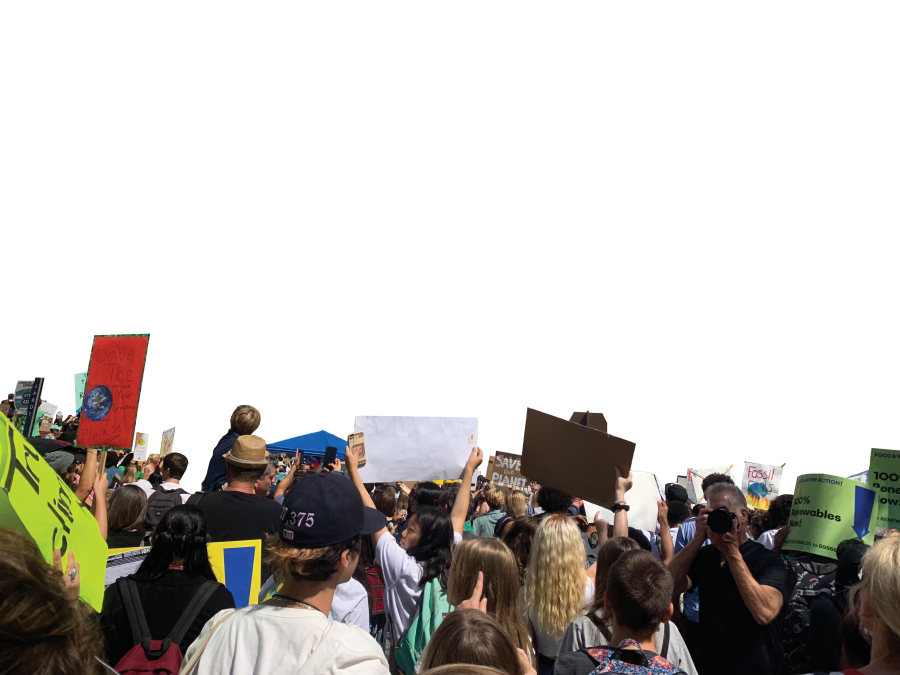Wildfires blazed across California, torching over 2.1 million acres of land in 2020 alone. The year’s hurricane season consisted of 30 named hurricanes, greater than any year in history. Global sea levels are rising around 3.3 millimeters annually, threatening millions along coastal cities. The UN now forecasts over 200 million climate migrants by 2050.
Since his presidential inauguration in 2016, Donald Trump and his administration have left the Paris Climate Accord, opened up federally protected land to oil drilling and filled countless governmental seats with known climate change deniers. As human industrialization heightens the damaging effects of climate change, the incoming Biden administration must face the effects of global warming, as its actions and legislative initiatives in the coming years will determine the fate of the planet.
Environmental Club leader Helen Graham ’21 said she understands the urgency of this crisis and believes that the longer the Biden administration takes to implement environmental changes, the greater the consequences will be.
“As a lot of our generation is aware, environmentally, things really are not looking good,” Graham said. “Climate change is currently a problem, and it’s getting to be an even bigger problem, and if we don’t start making changes now, those changes will become increasingly hard to make, if not impossible.”
Graham said that when Biden comes into power, she hopes to see a transition to clean energy usage and a distancing from the utilization of coal and oil for energy. Additionally, Graham said that for her, it is critical for large fossil fuel corporations, such as ExxonMobil and Chevron, to take responsibility for the carbon emissions they produce.
“I get frustrated when a lot of environmental change gets put on everyday people rather than big corporations,” Graham said. “Though switching from a plastic straw to [a] paper straw helps the environment, oil and coal and fuel companies are causing a great deal of the problem, so people shouldn’t feel that it’s only on them to change their lifestyles. These companies have to take responsibility for the damage they’ve made.”
Like Graham, Environmental Club co-leader Maya Mathur ’22 said she believes it is essential to hold corporations accountable for their carbon dioxide emissions and that these companies must be regulated to prevent further damage. Mathur also said she was greatly disappointed that during the Trump administration, people in power made many inaccurate claims about climate change. Mathur said this is exemplified, for instance, when Trump publicly denounced global warming’s legitimacy because daily weather was particularly cold on a given day.
“The Trump administration hasn’t been acknowledging what climate change really is and its really massive effects, and putting [those ideas] into the heads of people who are less educated or do not have access to proper environmental education [and] making them [think that] climate change is less of a pressing issue than it really is was very irresponsible,” Mathur said.
AP Environmental Science teacher Nadine Eisenkolb said she, too, felt a sense of disappointment with the lack of care for the planet that has been on display during the Trump administration. Eisenkolb said that because climate change is such a large-scale issue, it will take mass, corporate change to solve it.
“When the government steps in, a problem occurs because oftentimes politicians are funded by wealthy companies,” Eisenkolb said. “A lot of oil and coal companies have started to fund certain politicians in their races to power. Those politicians become incentivized to pass regulations that benefit those companies that funded their campaigns. Now, suddenly, we have politicians in office that have a difficult time passing regulations against carbon dioxide emissions.”
As a Hub Leader of the Sunrise Movement in Los Angeles, Geffen student Simon Aron ’24 said he felt extremely disheartened by the fact that Trump discredited science by overlooking the consequences of climate change and disregarding its detrimental effects on the human population. The Sunrise Movement, a youth-led, American political movement working to combat global warming, is best known for its massive push for progressive, legislative programs, such as the Green New Deal.
“Something that was really hard for me to see was when Trump came to California during the wildfires and met with the scientists, and it was so obvious people were dying, houses were burning, there was smoke everywhere, nobody could breathe and Trump said, ‘science doesn’t know,’” Aron said. “He was there, he saw that people were suffering and he still totally ignored these human experiences.”
Looking forward to Biden’s presidency, Mathur, Graham and Aron said they are fearful that Biden will not prioritize climate change and reduce national carbon emissions in order to appease large energy corporations and his political opposition. Aron said he hopes to see Biden reverse some of the Trump administration’s damaging policies.
“I think Biden will be able to re-enter the Paris Agreement,” Aron said. “I’m really worried though because there’s a history in Democratic politics of presidential candidates building up large coalitions and then winning and not fulfilling any promises, unless we push [them] like crazy. [I am concerned that] Biden will forget that it was young people and people of color who fought for him, and now he must fight for them.”
Aron believes that it is critical that climate activists and those who truly care for their planet to push the Biden administration to pursue protective climate policies throughout his presidency. He said he hopes to see Biden meet some of Sunrise’s legislative demands in the coming years.
“Sunrise has what’s called a ‘climate mandate,’” Aron said. “Young people and people of color were on the front lines of the fight for Biden to step into office, and now it’s Biden who has to respect those supporters because we’re the future of the Democratic party. For example, Sunrise has put out some Cabinet picks, like Deb Haaland, who would be the first-ever Indigenous Secretary of the Interior, which would be incredible. We’re also just trying to push for as much of the Green New Deal as possible through protests and other actions.”
Environmental Club member and activist Idalis McZeal ’23 said she hopes to see Biden prioritize people of color when tackling the climate crisis.
“I’m half Black, a quarter Mexican and a quarter white, so my family did vote for Biden because he promised to prioritize helping communities of color, [who] in the past haven’t been at the forefront of environmental justice, though they are the most affected by environmental inequalities,” McZeal said. “Fracking on reservations and concentrating communities of color in places where pollution is higher is just really common in this nation. People in Detroit, Ohio, Memphis, are chronically ill due to living in highly polluted areas and near toxic facilities.”
McZeal said she hopes people will make their voices heard and will push Biden out of leniency and towards critical, systematic environmental justice.
“You can call your local representatives and encourage them to push for environmental justice, which voices your concerns to people who have control and tells them what is important to you,” McZeal said. “Signing petitions and participating in protests are also great ways to get your voice heard.”
Aron said that although the effects of climate change have enormous repercussions, he hopes people will understand global warming’s direct effects on their own lives. Aron said this issue is not a matter of politics, but one of life or death.
“Our lives are on the line, and corporations and elites have given us a dying world,” Aron said. “A lot of people on the front lines, especially Black people and Indigenous people, are suffering right now from the effects of climate change. It’s a fight for our lives, and it’s just scary. We’re seeing that politicians and mega-corporations just don’t care, and we need to act now.”








































